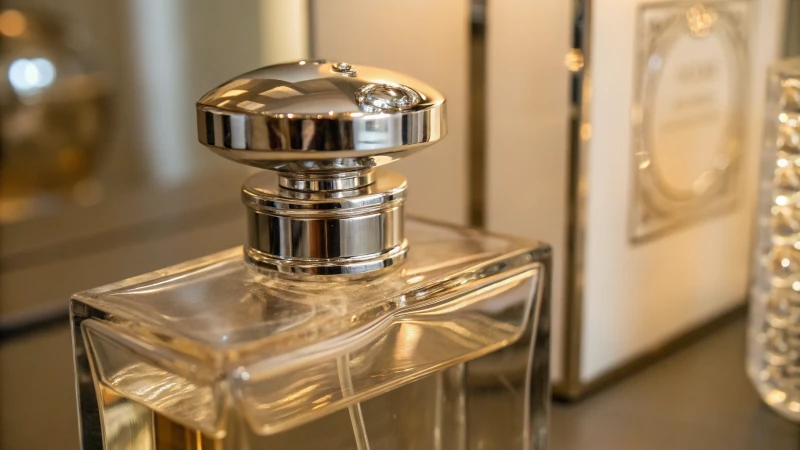
Have you ever wondered what makes the perfect perfume bottle cap?
Aluminum caps for perfume bottles are not just about looking good. They’re celebrated for their corrosion resistance, design flexibility, and eco-friendly nature. Opting for top-quality aluminum, like grades 5052 or 6061, ensures that the caps remain both durable and stylish, making them perfect for high-end cosmetics packaging.
When I first started exploring packaging options, I was overwhelmed by the choices. But diving into the details of aluminum caps revealed their true potential. These caps not only protect the precious scents inside but also add a touch of elegance to any bottle. Their versatility means they can be customized to reflect your brand’s identity perfectly. Plus, embracing recycled aluminum aligns with sustainable practices, enhancing your brand’s image. It’s like choosing a cap that tells your story—a blend of durability and design, supporting a greener future.
Aluminum caps are eco-friendly for perfume packaging.True
Aluminum is recyclable, reducing environmental impact compared to plastics.
5052 and 6061 aluminum grades lack corrosion resistance.False
These grades are known for their high corrosion resistance, ideal for packaging.
Why is Aluminum the Ideal Choice for Perfume Caps?
Ever wondered why aluminum is the superstar of the perfume world? Let me take you on a journey through its many wonders.
Aluminum is the best material for perfume caps because it’s lightweight, corrosion-resistant, and recyclable, ensuring fragrance quality while offering limitless design options.
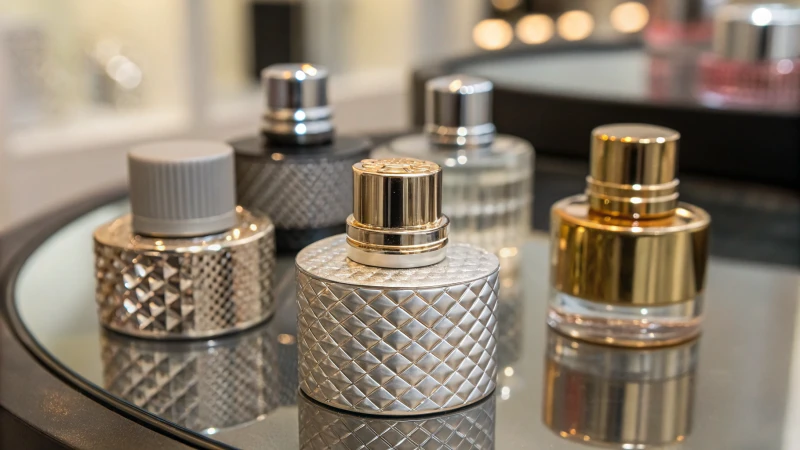
Lightweight and Durable
I remember the first time I held a perfume bottle with an aluminum cap—its feather-light feel was surprising! Aluminum’s lightweight quality is truly a game-changer, especially when you’re dealing with multiple products. This material not only adds an air of sophistication but also withstands the rough and tumble of daily use. Imagine never having to worry about your perfume cap denting or scratching, thanks to its durability1.
| Property | Benefit |
|---|---|
| Lightweight | Easy to handle and store |
| Durable | Withstands wear and tear |
Corrosion Resistance
Living in a humid climate, I often noticed how other materials would rust or lose their charm over time. But with aluminum, you can bid those worries goodbye. Its natural resistance to corrosion is a godsend, ensuring that no nasty chemical reactions alter your favorite scent or cause leakage.
Design Flexibility
The beauty of aluminum lies in its adaptability. I’ve seen brands transform simple caps into works of art, thanks to aluminum’s customization2 potential. Whether it’s sleek and modern shapes or vibrant, eye-catching colors, aluminum molds effortlessly to any design whim.
- Custom Shapes: Enhance brand identity.
- Surface Treatments: Achieve a luxurious finish.
Sustainability Factor
As someone who cares deeply about our planet, I’m thrilled by aluminum’s eco-friendly credentials. Its high recyclability means less waste and more sustainable choices for brands and consumers alike. Opting for recycled aluminum not only reduces environmental impact but also aligns perfectly with modern eco-conscious values.
- Recyclability Rate: High compared to other metals.
- Environmental Impact: Lower carbon footprint.
Quality Assurance
Ensuring quality in every aspect of my work is paramount, and aluminum delivers on this front as well. With rigorous quality control3 measures in place, these caps offer a reliable seal and preserve the essence of perfumes under any condition.
- Weather Resistance Tests: Validate product stability.
- ISO Certifications: Assure material quality.
All these attributes—lightweight durability, corrosion resistance, design flexibility, sustainability, and robust quality assurance—make aluminum an optimal choice for perfume caps. They not only enhance consumer satisfaction but also elevate a brand’s image in this competitive market. So next time you spritz your favorite fragrance, take a moment to appreciate the humble yet mighty aluminum cap.
Aluminum caps are heavier than plastic ones.False
Aluminum is lightweight, making it lighter than many other materials.
Recycled aluminum caps help reduce carbon footprint.True
Using recycled aluminum significantly lowers environmental impact compared to new materials.
How Do Custom Design Options Impact ROI?
Ever wondered how those unique design choices you make can boost your business’s profits? Let me share some insights that I’ve gathered from my own experiences in the world of custom design.
Custom design options impact ROI by making your brand stand out, which can increase the perceived value of your product and attract more customers. However, it’s important to weigh the initial costs against potential long-term gains through careful planning.
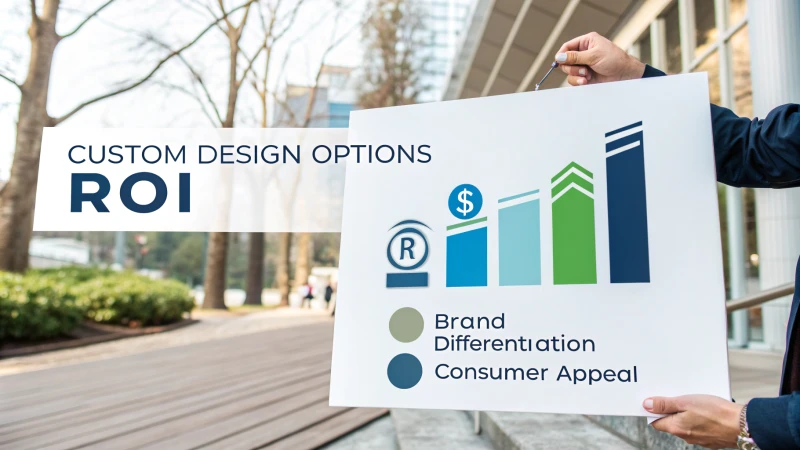
The Influence of Brand Differentiation
When I first started exploring custom design options for my business, I realized it was like stepping into a whole new world of possibilities. Custom designs can set your brand apart in a market that’s often flooded with similar products. Imagine walking down a supermarket aisle and seeing a product that looks unlike any other—that’s the power of differentiation. Once, I experimented with unique packaging for a product line, and it quickly became a talking point among customers, boosting our sales and ROI4.
Balancing Costs and Benefits
Embarking on custom design projects usually means higher upfront costs—think about mold creation or paying designers. I remember the first time I faced this challenge; it felt overwhelming to justify the expense. But then I looked at the long game: would these costs eventually pay off by boosting our brand’s appeal and product value? A detailed cost-benefit analysis, such as using an ROI calculator5, became my go-to tool to weigh these decisions effectively.
| Cost Factor | Description |
|---|---|
| Mold Costs | Fees for creating custom shapes or textures. |
| Design Fees | Payments for designers and creative teams. |
| Material Costs | Varied based on selected materials’ quality. |
Strategic Planning for ROI Enhancement
Strategic planning is like having a map for a journey—I learned this lesson the hard way when one of my projects didn’t align with our brand’s core values. Choosing design elements that resonate with your brand and audience is crucial. Keeping an eye on trends, like sustainability6, can also influence consumer behavior positively.
Examples of Successful Custom Design Implementation
One thing I always keep in mind is how luxury brands use custom designs to communicate exclusivity and justify higher prices. Take luxury perfume packaging, for instance—brands employ distinct shapes and premium materials that make their products irresistible.
- Luxury Perfume Packaging: Brands use unique shapes and luxurious materials to attract consumers, increasing product desirability.
- Tech Gadgets: Sleek and innovative designs can differentiate tech products in competitive markets, boosting sales potential.
By integrating insights from market analysis7 and listening to consumer feedback, I’ve found that businesses can make informed decisions about custom designs that effectively enhance ROI.
Custom design options always increase ROI.False
While custom designs can enhance ROI, they involve costs and risks.
Strategic planning is crucial for maximizing ROI with custom designs.True
Aligning design with brand and market trends enhances financial returns.
What Are the Sustainability Benefits of Using Aluminum?
Ever wonder why aluminum is the darling of eco-friendly materials? Let me share why it tops the charts in sustainability, from its recyclability to energy-efficient production.
Aluminum stands out for its high recyclability, energy-efficient production, and durability, making it a sustainable material choice. Impressively, over 75% of all aluminum ever produced is still being used today, underscoring its long-lasting nature and reusability.
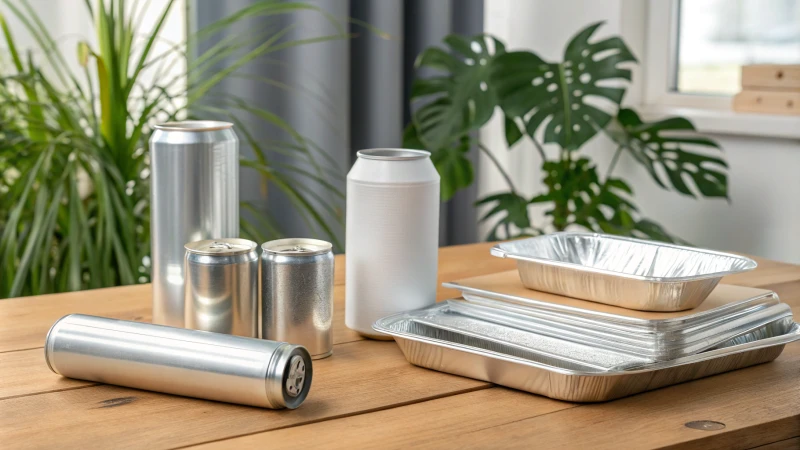
Aluminum’s Recyclability
When I first learned about aluminum’s recyclability8, it felt like discovering a hidden superpower. Imagine a material that can be recycled endlessly without losing quality—aluminum does just that. Recycling aluminum saves a whopping 95% of the energy needed to create new aluminum from scratch. This is a game-changer for industries aiming to cut down on their carbon footprint.
- Recycling Rate: Did you know that about 75% of all aluminum ever made is still in use? It’s because this metal can be recycled over and over again without compromising its quality.
- Energy Savings: To put it into perspective, recycling just one ton of aluminum saves up to 14,000 kWh of electricity.
Energy-Efficient Production
The journey of aluminum from ore to product has become more energy-efficient9 over the years. Thanks to technological advances, modern smelting processes now require significantly less energy, reducing greenhouse gas emissions in the process. Check out this comparison:
| Year | Energy Consumption (kWh/kg) |
|---|---|
| 1990 | 20 |
| 2020 | 13 |
Durability and Longevity
Aluminum isn’t just eco-friendly; it’s also incredibly durable. I recall visiting a factory where aluminum10 was the material of choice for many products due to its longevity. Its natural oxide layer acts like an invisible shield against corrosion, ensuring that products last longer and need fewer replacements.
- Corrosion Resistance: This natural oxide layer means aluminum can withstand the elements, making it perfect for long-lasting applications.
- Strength-to-Weight Ratio: Aluminum’s lightweight nature doesn’t come at the expense of strength, which is why it’s used in everything from airplanes to everyday packaging.
Choosing aluminum not only supports global efforts toward sustainability but also enhances brand image11 by aligning with eco-friendly initiatives. Businesses can enjoy cost savings and contribute positively to the environment by incorporating this remarkable material into their product lines. Explore further12 into how integrating aluminum in your product lines can amplify these benefits.
Discover more about aluminum recycling13 practices and see how they can transform your business operations and environmental strategies.
Recycling aluminum saves 95% of energy compared to new production.True
Recycling aluminum is highly energy-efficient, saving significant energy.
Aluminum production in 2020 used 20 kWh/kg of energy.False
In 2020, aluminum production used only 13 kWh/kg due to efficiency.
How Can You Ensure Quality Control in Aluminum Cap Production?
Quality control in aluminum cap production is like the secret sauce that ensures everything comes out just right. Without it, you’re risking your brand’s reputation and customer trust.
To ensure top-notch quality in aluminum cap production, focus on selecting high-grade materials, conducting thorough inspections, and following industry standards. Use advanced testing techniques and document processes for ongoing improvement.
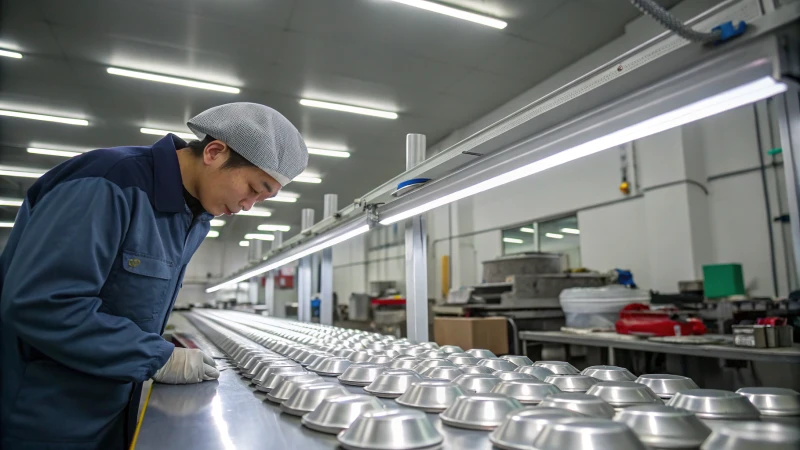
Material Selection: The Foundation of Quality
Picture this: I’m standing in a warehouse, surrounded by stacks of shiny aluminum sheets. Choosing the right grade, like 5052 or 6061, feels like picking the right ingredient for a secret family recipe. It’s essential because it ensures corrosion resistance14 and keeps the caps looking pristine. Using subpar aluminum? That’s like baking with expired ingredients—risky and likely to ruin the final product.
| Aluminum Grade | Corrosion Resistance | Cost |
|---|---|---|
| 5052 | High | $$ |
| 6061 | Moderate | $$$ |
Implementing Rigorous Inspection Protocols
I remember one time we caught a tiny defect during a visual inspection15—a small dent on a cap that could’ve easily gone unnoticed. This saved us from a potential disaster down the line. Using both manual checks and automated systems is like having multiple safety nets. Visual inspections catch surface defects while ultrasonic testing digs deeper to find internal flaws. Regular audits are our way of keeping the process honest and efficient.
Adhering to Industry Standards and Certifications
It’s not just about saying we meet standards; it’s about proving it. I once had an enlightening chat with a supplier who emphasized the importance of ISO 9001 certification—not just for compliance but for the confidence it instills in customers. Getting certifications from independent third parties16 is like getting a thumbs up from an unbiased referee, reducing return rates and building trust.
- Certification Type: ISO 9001, SGS
- Frequency of Audit: Bi-annual or as required
Advanced Testing Methods for Assurance
Imagine simulating a storm in a lab to see if your aluminum caps can weather it—literally. By performing accelerated weathering tests and simulating extreme conditions, we get a glimpse into the future of our products’ durability. It’s like preparing for the worst-case scenario so that we’re always a step ahead.
| Test Type | Purpose |
|---|---|
| Accelerated Weathering | Predicts long-term durability |
| Humidity Chamber | Assesses performance in moist conditions |
Continuous Improvement Through Feedback and Documentation
Keeping records isn’t just about ticking boxes—it’s about learning and improving. Detailed documentation helps me spot trends, whether it’s a recurring issue or a standout success. And encouraging feedback from the production team? It’s like having extra eyes and ears in the process, ensuring we’re always on the path to perfection.
Regularly review and update quality control protocols based on market feedback17.
5052 aluminum grade offers high corrosion resistance.True
5052 aluminum is known for its high corrosion resistance, making it suitable for quality cap production.
Ultrasonic testing is used for surface defect detection.False
Ultrasonic testing detects internal flaws, while visual inspections are used for surface defects.
Conclusion
Aluminum caps for perfume bottles offer durability, corrosion resistance, and design flexibility. They enhance brand image through customization and sustainability, making them ideal for high-end cosmetics packaging.
-
Explore how aluminum’s lightweight and durable properties make it an ideal material for various packaging applications. ↩
-
Discover how brands can leverage aluminum’s versatility to create standout custom designs. ↩
-
Learn about essential quality control practices that ensure the durability and reliability of aluminum products. ↩
-
Learn how custom design enhances consumer appeal, potentially leading to increased sales and better ROI. ↩
-
Discover tools to calculate the ROI of custom design projects, aiding in financial decision-making. ↩
-
Explore how sustainability trends influence product design and consumer behavior, impacting ROI. ↩
-
Understand market analysis methods for custom-designed products, helping tailor strategies for better ROI. ↩
-
Learn about how recycling aluminum significantly reduces energy usage and promotes sustainability. ↩
-
Explore how modern technological advancements make aluminum production more sustainable. ↩
-
Understand how aluminum’s durability contributes to sustainability by extending product life cycles. ↩
-
Find out how using sustainable materials like aluminum can boost brand perception. ↩
-
Discover why aluminum is a preferred choice for sustainable manufacturing. ↩
-
Learn about effective recycling practices and their environmental benefits. ↩
-
Understand the benefits of using high-grade aluminum like 5052 and 6061 for enhanced durability. ↩
-
Learn about effective visual inspection techniques that help identify surface defects early. ↩
-
Discover why obtaining ISO certifications is crucial for ensuring consistent product quality. ↩
-
Explore how to effectively use market feedback to improve manufacturing processes. ↩



